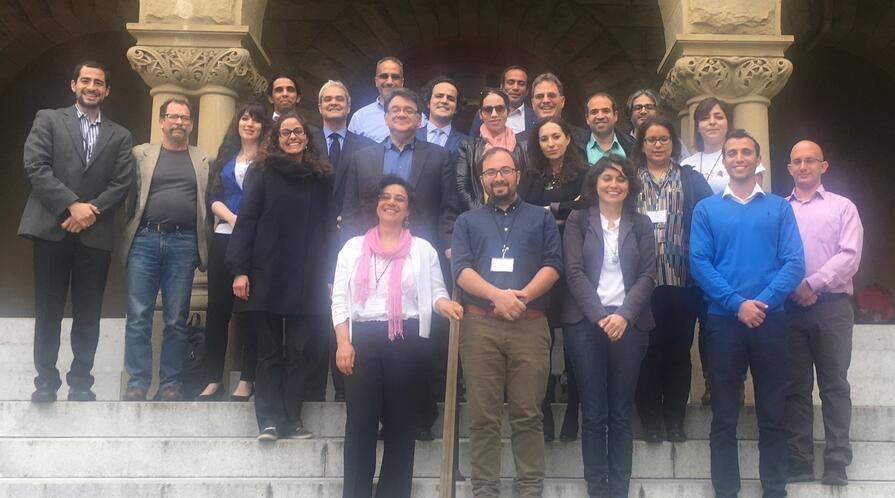During a recent visit to Stanford, Rabih El Chaer (’07), an alumnus of the Draper Hills Summer Fellows Program (DHSFP) at Stanford’s Center on Democracy, Development and the Rule of Law, shared his thoughts on the pervasive 'culture of corruption' in Lebanon, highlighting the need for strong counteractions from civil society. Last year, El Chaer founded Sakker el Dekkene, a Lebanese NGO dedicated to developing platforms to bolster accountability and track bribes. Lebanon is rated 136 out of 175 countries in Transparency International's 2014 Corruption Perceptions Index. Before founding Sakker el Dekkene, El Chaer served as the political and media advisor to the Kuawaiti Minister of Information and Youth.
1) What are the top challenges facing Lebanon today?
In the political spectrum, Lebanon is facing one of its biggest challenges: an institutional vacuum by which the country has been without a president for more than a year. This matter is also linked to the cancellation of the parliamentary elections. With the absence of a clear budget in the public administration since 2005, the debt exceeds 105 percent, which has increased unemployment rates.
Another challenge is the omnipresence of corruption in both public and private sectors. Last year, Lebanon ranked 136 out of 175 countries in Transparency International's Corruption Perceptions Index, dropping from the 127th place it took in 2013. And in 2013, the World Bank's Control of Corruption Indicator was at its second lowest since 1996. With the absence of accountability and transparency, corruption became engrained in Lebanon's political, administrative and economic environment, hindering the rule law and good governance.
Last but not least, the existence of refugees and instability in the region has been a great promoter for instability, unemployment, and population overgrowth, which Lebanon cannot handle.
2) What is the government doing to address this culture of corruption?
In 2008, the Lebanese government took the initiative and signed the United Nations Convention against Corruption treaty. This treaty includes 51 articles on anti-corruption. The government had the goodwill to initiate three pillar projects: access to information; whistle blower protection; and the establishment of the national anti-corruption authority.
But in reality, no law was voted for and no anti-corruption national plan was adopted. Furthermore, the lack of accountability perpetuates the problem, given the rampant corruption across sectors - including the judicial system - which was ranked third in the number of bribes paid based on citizen reports submitted through Sakker El Dekkene.
3) Tell us about some of the anti-corruption projects you have been working on at your organization - Sakkar el Dekkene.
Investigation and research are critical for Sakker el Dekkene’s plan to produce substantive content and data related to corruption, which will be used to push for change. This information includes bribe data, surveys, investigations, and reports, among others.
The second critical project is legal work, ranging from producing draft laws to helping public authorities implement the rule of law and defend individuals’ rights, all the way to taking corruption cases to court.
The Ombudsman Law was voted for in 2005 in Lebanon, but until now, the government has yet to establish the office, yet alone appoint its leadership. At this moment, we serve the role of an ombudsman.
Additionally, partnership with various organizations and authorities has an amplifying effect on all our activities. Partners include ministries, public administrations and other public authorities willing to collaborate, as well as private sector entities and other local and international NGOs. Lobbying with public sector stakeholders, ministers, judiciary, the media and others on the elections monitoring process will push the pressure to fight corruption to its highest level.
4) How do you engage the public in your work?
Awareness is done through a wide range of activities, including education at school and the university level; entertainment projects such as songs, cartoons, film festivals, award days; and other outside-the-box activities and events. We also have a strong public awareness campaign, engaging directly with the public in malls, fairs and events during our Kabseh (meaning "pressure") tours as well as on social media. Through our touring, we inform people about how they can use our platform to report deficiencies in public administration and identify system loopholes.
5) What challenges does the organization face today? How has the government responded to your projects?
Having a country where more than 50 percent of the nationals resort to corruption in order to have their needs met is very challenging. To top this off, many Lebanese do not report the corruption they witness, initiate, or are victims of. This makes it very challenging for us to receive an accurate number of reports.
Violence is another challenge we face. Some people react to our cause by resorting to violent means. Also, the fact that media in Lebanon can have a certain political affiliation is another challenge because the bias found in media does not help portray the earned image we have received in the public’s eye.
6) What advice would you give summer fellows alumni seeking to counter/combat corruption in their home countries?
It is important to always have the faith, willpower and patience to keep striving for a corruption-free country. A professional strategy based on facts, political neutrality, and transparency is key to making your argument more believable, feasible and durable.
Social media - including Facebook, Twitter and Instagram - are very important in helping spread your cause, vision, aim and activities.
Partnership and collaboration with civil society - including NGOs - is necessary to guarantee alliance and sustainability in spreading your vision. There is no prototype for combating corruption. Evolution – not revolution – is required. The fight against corruption is not with people; it is with the system.










